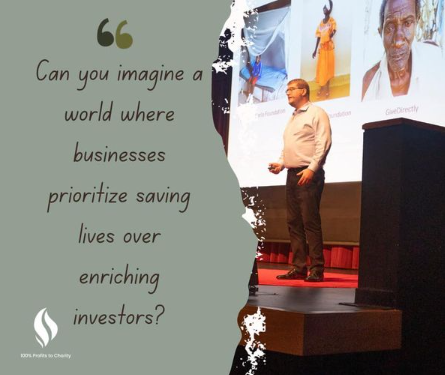Harnessing the power of diminishing marginal utility to save lives
by Frank J. Martin
Thinking at the margins will save lives. Focusing on the additional unit, the margin, is essential to making sound decisions in business. It also has the power to move us closer to meeting our moral obligation to give more of our resources to those who are suffering from a lack of them.
In Bitter Champagne, I offered a conceptual framework (the “Giving Trek”) to help us understand the multiple stages of giving and the mental states that are precursors to giving. I argued that there is a linear path on the way to the summit of Singer’s moral mandate – giving to the point of marginal utility. Alongside the framework, I argued that we are morally obligated to adopt a contemplative practice that would catalyze our movement up the Giving Trek. Every movement up, however small, is socially beneficial. As I noted in Bitter Champagne, “even if the practice does not lead us all the way to the top, which is unlikely for the vast majority of us, all forward motion is worthwhile. Few are willing or interested in the apex, but everyone can follow the practice of Bitter Champagne. Doing so leads only in one direction — toward progressively more morally acceptable behavior.” The practice was simple: pay attention to the dis-ease that one should feel between what we should be doing with our resources and what we are doing. The distance between our “isness” and our “oughtness” as Dr. Martin Luther King Jr. said. I argued that we have a moral obligation to pay attention to the dis-ease that one should experience while consuming luxuries. A bitter aftertaste with our champagne in acknowledgement that many lack clean drinking water. Though it didn’t occur to me at the time, I think Bitter Champagne falls somewhere in the universe of practices that F. Scott Fitzgerald made famous when he wrote that “the test of a first-rate intelligence is the ability to hold two opposing ideas in mind at the same time.” I still believe in the catalytic power of Bitter Champagne, but I have come to the conclusion that marginal thinking may be a more powerful force to harness in our quest to give more to those in need.
Marginal thinking asks us to reduce decisions to the margin (i.e. the additional unit). Bitter Champagne assumed you would go ahead with your desire for a glass of Dom Perignon but asked that you hold some mental space in your enjoyment of that luxury to contemplate the moral implications of spending on champagne when others lack access to clean water. Prosecco Please is another contemplative practice we should incorporate at the point-of-sale of a luxury good – what are my options and is the marginal improvement between various options worth forgoing the ability to give the difference in price away? Prosecco Please concedes the move from zero to one – you have already decided to have sparkling wine instead of tap water and focuses on the refinements, the marginal improvements, from the entry level to a more refined version of the same drink. This decision point is ripe for moral contemplation married with marginal thinking. How much more enjoyment will I get from the more expensive (and, theoretically at least, marginally better) version of whatever luxury item I am consuming than from the less expensive option in the same category? How many lives can I save with the difference in price between the prosecco and the champagne? In essence, you should always be looking for what doctors and pharmaceutical companies call the minimum effective dose – of the various options presented which one will achieve the desired result at the lowest price point?
This contemplative practice’s power is super-charged by an asymmetry that exists when analyzing the situation through another economic principle – the law of diminishing marginal utility. Each additional unit, or subsequent refinement, provides us smaller and smaller increase in total utility. There is likely a big jump in utility from water with a meal to the least expensive prosecco on the menu and, perhaps, a meaningful one from prosecco to champagne, and then an ever-decreasing rate of increase in utility as you make your way up to the fanciest bottle of champagne the restaurant has on offer. Now, charged with an obligation to add marginal thinking to our consumption patterns to meet our moral obligations (as I argued in Bitter Champagne: “If we are morally obligated to redistribute our resources, then we are also morally obligated to take the prerequisite actions necessary to induce this action.”), we are supported in our efforts by the invisible law of diminishing marginal utility. That is, we aren’t giving up that much happiness by forgoing the more refined champagne when we decide to save the additional dollars so that we may give them to others. We experience the law of diminishing marginal utility in our consumption of champagne, but the funds we donate to effective organizations working to help those living in extreme poverty have miles of headroom before their impact diminishes. There simply is so much suffering in the world due to extreme poverty that in many cases the increase in utility created by our donated funds is that enormous, life-changing first step from zero to one. There may come a time when the law of diminishing marginal utility would come in to play for our donations, but we are so far removed from that situation that it is a reasonable position to simply not worry about how we should modify our behavior as we approach that state. As of now, we can give to our hearts content (or better, should give) and know that every dollar given is meaningfully improving the lives of those living in extreme poverty. This is more profound than it first appears – we experience diminishing marginal utility in our consumption, but our dollars given to those living in extreme poverty today don’t in any real sense. It’s the greatest arbitrage trade of all time.



